职高英语拓展模块 第五单元 Unit 5 Good Manners.wps 练习题
Unit 5 Good manners总
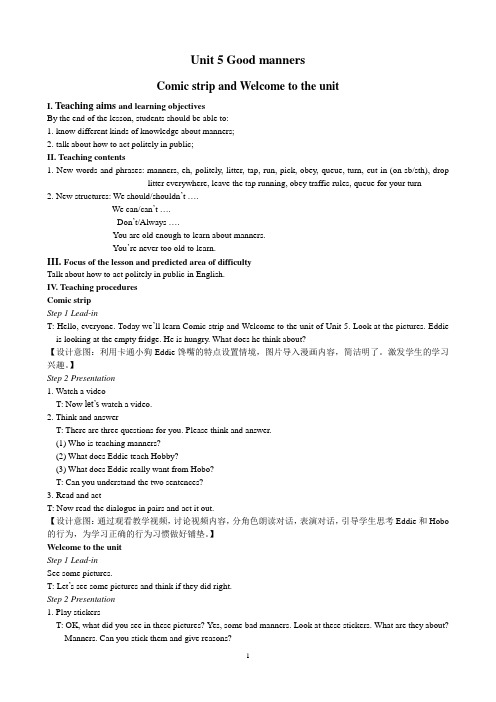
Unit 5 Good mannersComic strip and Welcome to the unitI. Teaching aims and learning objectivesBy the end of the lesson, students should be able to:1. know different kinds of knowledge about manners;2. talk about how to act politely in public;II. Teaching contents1. New words and phrases: manners, eh, politely, litter, tap, run, pick, obey, queue, turn, cut in (on sb/sth), droplitter everywhere, leave the tap running, obey traffic rules, queue for your turn2. New structures: We should/shouldn’t ….We can/can’t ….Don’t/Always ….You are old enough to learn about manners.You’re never too old to learn.III. Focus of the lesson and predicted area of difficultyTalk about how to act politely in public in English.IV. Teaching proceduresComic stripStep 1 Lead-inT: Hello, everyone. Today we’ll learn Comic strip and Welcome to the unit of Unit 5. Look at the pictures. Eddie is looking at the empty fridge. He is hungry. What does he think about?【设计意图:利用卡通小狗Eddie馋嘴的特点设置情境,图片导入漫画内容,简洁明了。
8B_Unit5_Good_manners知识点详解加练习讲解
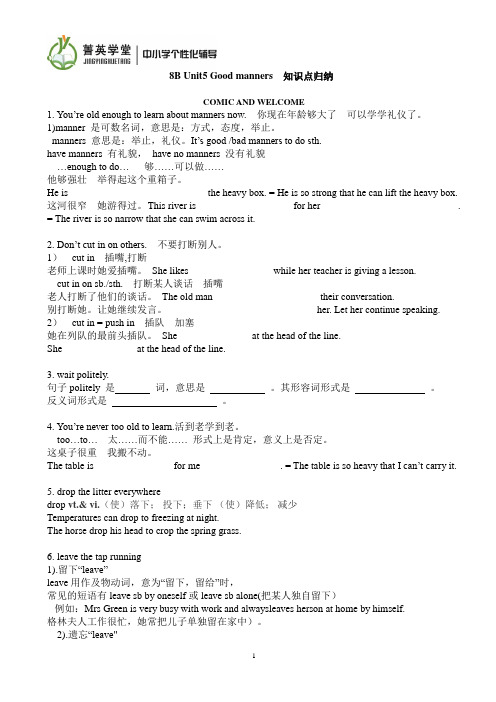
8B Unit5 Good manners 知识点归纳COMIC AND WELCOME1. You’re old enough to learn about manners now. 你现在年龄够大了 可以学学礼仪了。
1)manner 是可数名词,意思是:方式,态度,举止。
manners 意思是:举止,礼仪。
It’s good /bad manners to do sth.have manners 有礼貌,have no manners 没有礼貌…enough to do… 够……可以做……他够强壮 举得起这个重箱子。
He is ______ _______ ______ _______the heavy box. = He is so strong that he can lift the heavy box. 这河很窄 她游得过。
This river is ________ __________ for her _______ _________ __________. = The river is so narrow that she can swim across it.2. Don’t cut in on others. 不要打断别人。
1) cut in 插嘴,打断老师上课时她爱插嘴。
She likes __________ ______while her teacher is giving a lesson.cut in on sb./sth. 打断某人谈话 插嘴老人打断了他们的谈话。
The old man ______ _______ _______their conversation.别打断她。
让她继续发言。
_______ _______ ______ _______ her. Let her continue speaking.2) cut in = push in 插队 加塞她在列队的最前头插队。
中职英语-拓展模块-unit5演示教学
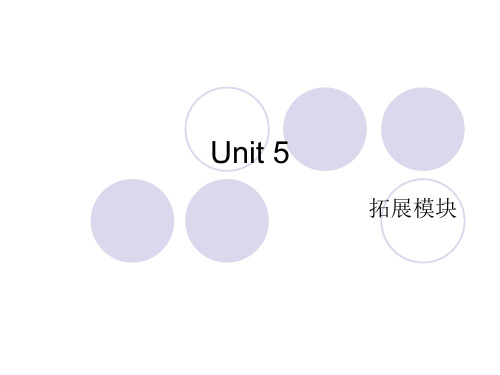
“因……而道歉” apologize for (doing) sth.
eg:Perhaps we ought both to apologize for it .
也许我们俩应因此事得道歉。 I must apologize for calling (call) so late . 很抱歉这么晚了给你打电话。 I have come to apologize to you . 我是来向你道歉的。
difficult .
, I was wasting my
time .
我发现这个工作太难了,换句话说,我在浪费时间。
In doubt
“不肯定的,不知如何是好,怀疑” If you are in doubt ,you’d better not do it . 如果你不确定,最好别做。 All the time she was in doubt whether she
face
“丢脸,丧失声誉” lose one’s face 保全面子 face-saving eg:He will lose (his) face if he
does not keep his promise . 如果他不守诺言,他会丢面子的。 If you can’t answer such simple question,
Respect ① v.尊重 尊敬 ② n. 尊敬 敬意
respect oneself “有自尊心,自重” eg:If you don’t respect yourself ,
how can you expect others to respect you ? 如果你不自重,怎么指望别人尊重你呢?
you will lose (your) face with your class .
Unit 5 Good manners课件2

before you walk into the house. ⑥ Don’t seat yourself before the
host tells you where to sit.
பைடு நூலகம்
CAN YOU TELL ME?
What should we do and shouldn’t do in these public places?
FAST READING
Answer my questions:
What is the conversation about?
Good manners in the UK
Who is Daniel talking to?
conversation?
Do they talk about age?
How do they behave in public?
PARTS 3 (LINES 18-26)
Are British people polite at home?
What else should we pay attention to in public?
“Manners make the man.”
work in groups to write down the rules for being polite in the situation of Chinese culture.
Situation Rules for being polite in
Greeting your
teacher
Stand straight and say “Laoshi hao”; you don’t have to take your hat off, but you must get off you bike when greeting.
《Good Manners》中职英语(拓展模块)Unit 5ppt课件1【语文版】
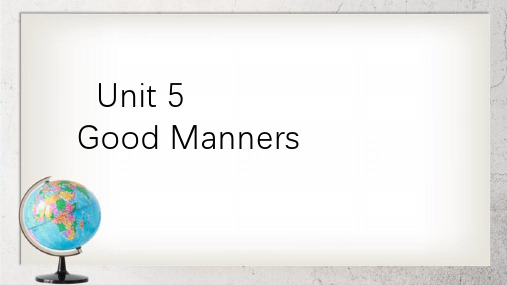
Homework
• 1.Copy the new words on P52, twice per word.(4/8 No.12 )
• 2.Finish the exercises on P54-55
What is good manners?
• help others • say thanks to somebody • apology •…
难读到老师的表情。认真听讲不单纯是指听老师说的话,把握老师的表情和语调之类的小细节也是很有必要的。说话比平时更用力,或者表情严肃地强调的那个部分几乎百分之百地会出现在考试中。但是如果坐在后面,那种重要的提示就全都错过了。
•
与此相反,如果坐在前面,首先心情就很不同,自己比别人靠前的感觉让你听课时的态度变得更积极。与老师眼神交会的机会增多,感觉就好像是老师在做一对一个人辅导。
2019/8/9
教学资料精选
15
谢谢欣赏!
2019/8/9
教学资料精选
16
sorry to avoid a face-to-face apology.
a mistake
a letter
a text message
编者语
• 要如何做到上课认真听讲?
•
我们都知道一个人的注意力集中时间是有限的,一节课45分钟如何保持时时刻刻都能认真听讲不走神呢?
•
1、往前坐
•
坐的位置越靠后,注意力就越难集中。老师不会注意到你的事实可以让你不再紧张,放心去做别的事情。坐在后面,视线分散,哪怕你是在看老师,如果有人移动,你的视线就会飘到那个同学的后脑勺上去,也就无法集中注意力。 而且,坐在后面很
•
关键是,出错了你就知道上课时应该重点听哪里,注意力自然就能集中了。
中职英语拓展模块Unit 5 Good Manners
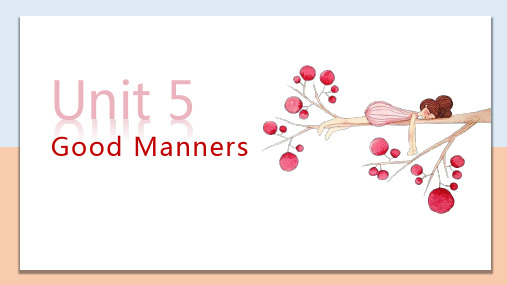
5. lose one’s temper 发脾气 You should never lose your temper with your kids- it'll only
make things worse.
6. be ashamed of 为…感到羞愧 I felt ashamed of the things I’d said to him.
7. lose face 丢脸 No government likes to lose face like that. They don't want a war, but they don't want to lose face.
8. regret v./n. 后悔,遗憾 Don’t do anything you might regret. I regret leaving school so young. I have no regrets about leaving.
a few
few
All she wanted was __a_f_e_w___ moments on her own. She saves __a_l_i_tt_le__ money every month. His theory is difficult; ___fe_w____ people understand it. They had ___li_tt_l_e_ money to spend.
Making an apology helps to mend a damaged relationship and may even strengthen a friendship.
1. apology n. 道歉 I hope you are going to make an apology. We would like to offer our sincere apologies for the delay.
中职英语拓展模块Unit 5

4. Read and complete.
A. Do you want to go with me? B. Do you like playing tennis? C. I’d like to invite you to play tennis with me. D. I prefer swimming.
happened 32 years ago
Price: 80 yuan
6. Read and match.
A Ticket C Poster B Report D Notice B Report _________________ Pride for Africa as Spain strike gold
W: Where did you go yesterday?
M: I went to play tennis in the public park. W: How often do you play tennis?
M: Twice a week. __________________________
international trade company. I spent about two months there and experienced the nervousness, the excitement and the pleasure of working in a company. I started with answering phone calls at the front desk. At first, I took it as a simple job, but soon I realized that, to be a qualified receptionist, I must know well of the company and always be ready to answer questions. Fortunately, I am a quick learner and made great progress in a week. I also helped my colleagues sending faxes,
Unit 5《Good manners》(Welcome to the Unit)精品课件

Welcome to the unit
PPT教学课件
Do you have good manners?
Smile
Doing the right things in the public places.
We can’t drop litter everywhere! We should drop litter into the rubbish bin!
• Eddie: First, always share your things with others. Second…
• Hobo: Hey, that’s my cake!
• Eddie: Second, don’t cut on others. Always wait politely. /pə’laitli/礼貌地
Please complete the form.
Good mWae nsnheorusld
BWade mshaonunldenrs’t
In the library
keep __q_u_ie_t_ keep the library _c_le_a_n__ _p_u_t__ the booksb_a_c_k__ after reading chat or __ea_t__ in the library
• Hobo: You should learn about manners too.
You’re never too old to learn.
Eddie tells Hobo that he is old _e_n_o_u_gh to learn about manners. Hobo doesn’t _u_n_d_e_r_s_ta_n__d_what Eddie means. Eddie starts to _te_a_c_h_ hobo some good manners. First, Eddie asks Hobo to always s_h_a_r_e_ things with others. While saying so, he takes the _c_a_k_e_ from Hobo’s hand.
语文版中职英语(拓展模块)Unit 5《Good Manners》ppt课件1

1.We apologize when we have said or done something t_h_a_t m__a_y_h_u_rt_o_t_he_r_s__ ?
2. We say, “_I’_m__so_r_ry___. I’m late.” when we are late for class.
• They certainly need your help.
• Help should be given to those who need it.
• I don’t think you need to help him. • The vegetable garden needs watering.(注:
• Respond to the apology: • “It’s all right” • “Never mind” • “I forgive you” • “We all make mistakes”
Homework
• 1.Copy the new words on P52, twice per word.(4/8 No.12 )
• 8.regret to do和regret doing 之间的区别
• Regret to do sth.很遗憾地/抱歉地做(事情还没有做)
• I regret to tell you that you can’t pass the examination.我 很遗憾地告诉你你没有通过这次考试.
• They are familiar with each other. 注意区分与be familiar to的用法。be familiar to译为“为… 所熟悉”,主语通常是人们所熟悉的事物,宾语通常是人.例 如:This is a subject which is familiar to you.这是你熟悉的 一门学科.
Unit 5 Good manners课件(42页)
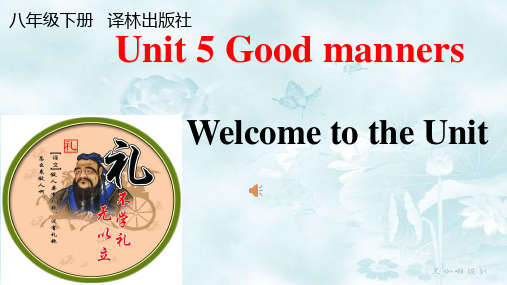
givTeihpis:seaTt o
towtheeolmd ust
boebspmuegboylkioce(o遵ind守ci)titzheenhcrresoulps(sl公tehtehse民olrado)an,dd
have good manners(礼貌,礼仪).
paint on the wall
speak loudly in the cinema
八年级下册 译林出版社
Unit 5 Good manners
Welcome to the Unit
What are good manners? Do you have any good manners?
Hello
Is it a good manner?
It is a good manner to help the old.
Is it a good manner?
It is a bad manner to pick flowers.
Is it a good manner?
It is a bad manner to push in before others.
Is it a good manner?
It is a bad manner to drop litter everywhere.
A: What should we do in the library? B: We should _k_e_e_p_q_u_i_e_t in the library.
A: What are they doing? B: They are ___d_ro_p_p_i_n_g_l_i_tt_e_r _e_v_e_ry_w__h_e_re__.
A: What should the boy do when he
Unit5Goodmanners单元讲义牛津译林版八年级英语下册

Unit 5 Good mannersWele to the unit1. good manners 良好的礼仪2. be old enough to do sth. 年龄够大可以做某事3. share your things with others 和别人分享你的东西4. cut in (on sb/sth) 打断某人5. wait for sb politely 礼貌地等待某人6. You are never too old to learn. 活到老,学到老。
7. drop littler everywhere 随处扔垃圾8. leave the tap running 让水龙头一直流着9. pick flowers in the park 在公园里采花10. keep quiet in the library 在图书馆里保持安静11. obey traffic rules 遵守交通规则12. queue for your turn 排队等候你的顺序13. Anything else? 还有其他什么吗?14. put them back after reading 在读完后把它们放回去Reading1. invite Jenny to talk about manners in the UK 邀请Jenny去谈论英国的礼仪2. the proper way to greet people 和人们打招呼的正确方式3. shake one’s hand 与某人握手4. meet you for the first time 第一次见到你5. greet relatives or close friends with a kiss 用亲吻和亲戚朋友打招呼6. start a conversation 开始一次谈话7. avoid subjects like age, weight or money 避免像年龄,体重或金钱那样的话题8. behave politely in public 在公共场所表现得有礼貌9. It’s rude to push/ cut in before others. 插队到别人前面是不礼貌的。
Unit5 good manners

Unit5 good manners单词知识点详解:(comic—reading)1.manners n.礼仪you should learn about manners.2.cut in on sb 打断谈话don’t cut in on others3.politely adv礼貌地always wait politely4.litter n.垃圾don’t drop litter everywhere5.tap n水龙头turn on the tap. Don’t l eave the tap running.6.Run vi流动the sound of running water 逃跑run in all directions7.Pick vt采,摘pick flowers in the park pick up the paper 捡起8.obey vt 遵守,服从obey traffic rules you cannot fail to obey it.9.Queue vt 排队等候queue for your turn. A long queue 一条长队10.turn n.轮流it’s your turn to do sth 轮到你去take turns 轮流11.proper adj 符合习俗的,正确的the proper way to do sth 做某事的正确方法12.greet vt 问候greet sb warmly13.shake one’s hand 握手14.kiss vt 亲吻n 吻greet sb with a kiss==kiss sb15.close adj 亲密的close friends closely 紧密地(work closely with sb)16.conversation n 谈话start a conversation a private conversation17.avoid vt 避免avoid doing sth I always avoid meeting him.18.subject n话题avoid subjects like age, weight or money19.behave vt 表现behave politely in public behavior n.表现20.public n 民众,公众in public21.push vt 推,挤push in before others 再别人面前插队22.bump vi bump into sb 撞上某人23.in one’s way挡路on the way在途中by the way顺便说一下24.touch vt触碰don’t touch it.25.excuse vt原谅excuse me.26.till conj =until they will wait politely till you move.27.as well 也=too28.loudly adv shout or laugh loudly 大叫和大笑29.saying 谚语use English sayings 使用英语谚语30.Roman n. 罗马人when in Rome, do as the Romans do.短语默写(comic ---reading)1.good manners文明礼仪2.old enough to do sth.(年纪)足够大可以做。
中职英语拓展模块Unit 5(课堂PPT)
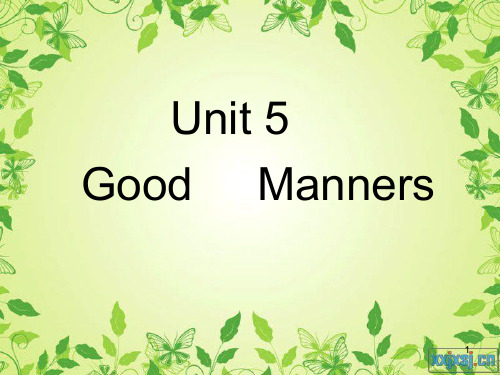
4
Reading
Making an Apology
5
relationship 关系;关联
lose (one’s) face 丢面子
familiar 熟悉的
face-to-face 面对面
be familiar with熟悉,通晓
direct 直接的;
interpersonal人与人之间的
指挥,指导
3. We respond to an apology to show that we _f_o_rg_iv_e__th_e_p_e_rs_o_n__.
4. If someone has said sorry to you ,you should say, “_I_t’s__al_l_ri_g_h_t __” or “_N_e_v_e_r _m_in_d___”.
1.We apologize when we have said or done something t_h_a_t m__a_y_h_u_rt_o_t_he_r_s__ ?
2. We say, “_I_’m__s_o_rr_y__. I’m late.” when we are late for class.
(F)When people cause inconvenience to others , they needn’t
apologize.
(F)Making an apology means losing face.
8
• Complete the following answers to the questions according to the text.
10
11
12
13
14
精美课件PPT Unit 5 Good manners P4 Integrated skills课件

Public signs • Are used in public places
• Often (1) _b_ri_g_h_t_ in colours • Often have (2) _p_i_c_tu__re_s_ on them
• Help explain things and give us useful
Observe the following signs and answer the questions:
☺What do they mean?
☺Where can you see them?
No smoking
No climbing
Stop
No littering
No photos
A1
Here are some examples:
(11)N_o__li_tt_e_r_in_g (12) _N__o_p_h_o_t_o_s
(13)N_o__s_m_o_k_in_g (14) _N_o__p_a_r_k_in_g
Work in pairs.
Make a conversation using the information in A3.
Unit 5
Good Manners
Words review
public adj. 公共的,公开的 explain v. 解释 keep sb from sth 保护,使免受
warn vt. &vi. 警告,告诫 parking n. 停车
litter vi.& vt. 乱丢杂物
Objectives
To search for some English sayings
Write a short passage about rules in public places.
《U5 Good manners Integrated skills》 (3)精品优质课件
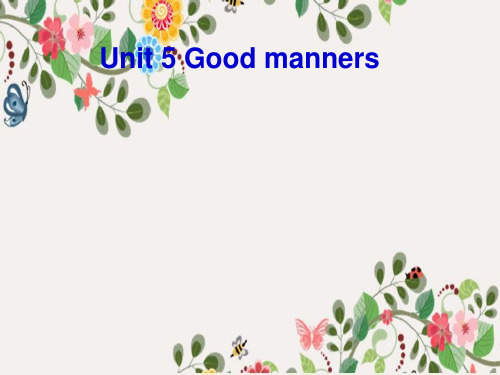
Here are some examples:
(11)_N__o_l_it_t_e_ri_n_g_______ (12)_N__o_p_h_o_t_o_s________ (13)_N__o_s_m__o_k_in_g_______ (14)__N_o_p__a_rk__in_g_______
1. Amy is talking with her cousin Shirley about sighs used in public places. public adj. 公共的,公开的 e.g. The town has its own public library and public gardens. 那城市有自己的公用图书馆和公 园。
2. If you have enough money and time, where do you want to go? Why?
Places of interest
the Great Wall
( Beijing, China )
the Statue of Liberty
( New York, the USA )
the Golden Gate Bridge ( San-Francisco, the USA )
the White House ( Washington, the USA )
the Sydney Opera House.
Sydney , Australia
Tower Bridge ( London, England )
have (4) _p_i_c_tu_r_e_s_ on them. Public signs help (5)_e_x_p_l_a_in__ things. Most of them give us (6)_u_s_e_f_u_l_ information. They help us (7) _f_in_d__o_u_r_w__a_y_ tell us about the (8) _p_l_a_ce_s__a_ro_u__n_d_u_s_, keep us (9)_s_a_f_e_f_ro_m___d_a_n_g_e_r and warm us (10)_n_o_t__to__d_o_s_o_m__e_th_i_n_g__.
- 1、下载文档前请自行甄别文档内容的完整性,平台不提供额外的编辑、内容补充、找答案等附加服务。
- 2、"仅部分预览"的文档,不可在线预览部分如存在完整性等问题,可反馈申请退款(可完整预览的文档不适用该条件!)。
- 3、如文档侵犯您的权益,请联系客服反馈,我们会尽快为您处理(人工客服工作时间:9:00-18:30)。
Unit 5 G ood MannersI. 语音知识:从A、B、C、D四个选项中找出划线部分与所给单词划线部分读音相同的选项( ) 1. repeat A. tend B. event C. retell D. strange ( ) 2. doubt A.shout B. trouble C. touch D. enough ( ) 3. mutual A. rude B. funny C. full D. produce ( ) 4. sincere A. course B. chance C. cable D. contry( ) 5.chance A. children B. charactor C.chemistry D ChristmasII.单选( ) 1. We sometimes do or say something that may ______ other people.A. injureB. destroyC. hurtD. wound( ) 2. Making an apology may ______ a damaged relationship.A. mendB. repairC. helpD. perfect( ) 3. Are you familiar ______ some expressions for apologizing?A. toB. forC. ofD. with( ) 4. If you missed your friend’s party, you may say, “______”.A. You know I couldn’t make itB. I am so sorry for not being able to attend your party. I was very busy that day.C. It’s not my faultD. Pardon( ) 5. I am terribly sorry for that, please accept my ______ apology.A. goodB. sinceC. sincerelyD. sincere( ) 6. When you realize that you were wrong for losing your temper, you may say, “I apologize for my poor ______”.A. actB. thingC. attitudeD. temper( ) 7. When someone apologizes to you, you may say, “______”.A. I’m sorryB. It’s all rightC. Excuse meD. pardon( ) 8. He apologized not for having done something wrong, but for the inconvenience he ______.A. had causedB. had been causedC. would takeD. has done( ) 9. Chinese people and Japanese people usually feel ashamed ______ making apologies.A. byB. ofC. withD. for( ) 10. If you are not sure whether the person would accept your apology, you may avoid a ______ situation.A. back-to-backB. teeth-to-teethC. face-to-faceD. hand-to-hand()11. I’d rather ride a bike as bike riding has _____ of the trouble of taking buses.A. muchB. allC. neitherD. none()12. I need some blue ink today but there is _____ at hand.A. notB. nothingC. a littleD. none()13. - -May I help you with some trousers, sir?-Yes, I'd like to try those blue ____.A. oneB. onesC. pairD. two()14. We couldn't eat in a restaurant because _____of us had _____money on us.A. all; noB. any; noC. none; anyD. no one; any()15. ---Would you like some wine? ---Yes,just _____.A. littleB. very littleC. a littleD. little bit()16. There will be only _____small differences between the twins.A.few B.a few C.little D.a little()17. ---Have you a dictionary? ----Yes, I have a good ______.A. itB. someC. thatD. one()18. --- How many tigars did you see in the zoo?--- ________.A. NoneB. No oneC. NothingD. not some()19. Though it was very hot, there were still_______ people in the street.A. littleB. a littleC. fewD. a few()20. Sorry, I can’t answer your question. I know_______about the news.A. noneB. littleC. fewD. neitherIV. 完形填空:There are two men in important positions in my office –Mr. Thompson and Mr. White. Everyone enjoys working with Mr. Thompson, ___1___no one likes Mr. White.Mr. Thompson is always thoughtful and considerate. When he wants something___2___, he’ll ask “Would you mind getting this information for me, please?” Mr. White is just the ___3___. He usually shouts ___4___the room, “Get me this memorandum, and hurry up.”Mr. White surprised us this morning, though. At first we thought he must be sick. He was ___5___ and agreeable. “Miss Erickson,” he asked, “if it isn’t too much ___6___ for you, could you please make these telephone calls for me?” June Erickson was astonished. Right after that, Mr. White said, “Miss Reed, would you be so kind ___7___ open the window? It’s quite warm in here.” Then he talked to me. “I’d appreciate it very much if you’d mail these letters for me.”We couldn’t imagine why he was behaving so___8___. Should we offer him aspirins? Or had Mr. White changed his personality?The situation was soon cleared up. “Ladies,” Mr. Thompson said, “I’ve been ___9___that the president of the company will be here soon. He’s very interested in the welfare of his employees and will have some __10___to ask you about your working conditions here.”( ) 1. A. but B. and C. or D. still( ) 2. A. do B. done C. to do D. doing( ) 3. A. same B. another C. opposite D. other( ) 4. A. with B. for C. at D. across( ) 5. A. kind B. hard C. rude D. terrible( ) 6. A. question B. trouble C. problems D. difficulty( ) 7. A. in order to B. that C. as to D. and( ) 8. A. happily B. wildly C. funny D. strangely( ) 9. A. told B. said C. telling D. asked( ) 10. A. things B. questions C. problems D. troublesV. 阅读理解:AWhen meeting people, the way you dress, move, shake hands, and look at others can sometimes be more important than what you say.You should do as follows.Stand up when you are introduced to another person. Standing shows that you are interested in meeting the other person. Look directly at the person you are meeting.Shake hands with a strong, firm handshake. If you have gloves on, take them off. Reach your right hand out. Grip (紧握)the other person’s hand firmly. Do not crush (过于用力), please! Shake just once and let go. Do not hold the person’s hand for long. If your hands are dirty or wet, do not shake hands. Say “Sorry, my hands are dirty.”In formal situation there are special rules for introducing two people. For people in different ranks, you should introduce the subordinate (下属)to the superior (上级)first. Among equals, outside of work, you should introduce the younger person to the older one, and the male to the female. In a business office, people may be introduced by first and last names. At some work sites, male workers might use their last names only. At a party, people are often introduced by first names.Do not use business cards in social introduction. If you later talk about business, you can ask for the other person’s business card. It’s OK to write notes to help you remember details of the meeting on the back of the card.Look at the person you are talking to. Use the person’s name when you talk t o him or her. Find out what the other person is good at or likes to talk about. Avoid personal questions. Don’t ask their age, how much they paid for something, or how much money they earn. Don’t interrupt when someone else is talking. On the other hand, d on’t talk too long.Don’t whisper to keep another person from hearing your conversation. Don’t brag (吹牛)about yourself.( ) 1. According to this passage, ______ sometimes is not so important as ______.A. the way you dress….what you sayB. the way you shake hands…the way you dressC. the way you look at others…the way you dress, move and shake handsD. what you say… the way you dress, move, shake hands and look at others( ) 2. Which of the following should you do when you are introduced to anotherperson?A. Stand up, look directly at the person, and shake hands with a strong, firm handshake for longB. Look directly at the person, stand up and crush the person’s hand with a strong hand for just onceC. Stand up, look directly at the person, and shake hands with a strong, firm handshake for just onceD. Stand up, do not look directly at the person, shake hands with a strong, firm handshake. ( ) 3. When you are going to introduce a new employee and the boss to each other, you should introduce ______ first.A. yourself to the bossB. the employee to the bossC. the employee to yourselfD. the boss to the employee( ) 4. When you talk to John Benson, you should call him ______.A. Mr. BensonB. Mr. JohnC. SirD. Mister( ) 5. When you have dinner with Jack, Mary and Tom, and you want to talk to Mary, it is polite that ______.A. you talk to Mary loud enough so that the others can hearB. you ask Mary to come out to talk with youC. you talk to Mary in a low voice so that the others can’t hearD. you whisper to MaryBEveryone needs friends. We all like to feel close to someone. It is nice to have a friend to talk to, laugh with, and do things with. Surely, there are times when we need to be alone. We don’t always want people around. But we would feel lonely if we never had a friend.No two people are just the same. Sometimes friends don’t get along well. That doesn’t mean that they no longer like each other. Most of the time they will make up and go on being friends.Sometimes friends move away. Then we feel very sad. We miss them very much. But we can call them and write to them. It could be that we would even see them again. And we can make new friends. It is surprising to find out how much we like new people when we get to know them.Families sometimes name their children after a close friend. Many places are named after men and women who have been friendly to people in a town. Some libraries are named this way. So are some schools. We think of these people when we go to these places.There’s more good news for people who have friends. They live longer than people who don’t. Why? It could be that they are happier. Being happier helps you stay well. Or it could be just knowing that someone cares. If someone cares about you, you take better care of yourself. ( )6. The first paragraph tells us _________A.making friends is the need in people’s lifeB.no one needs friendsC.we need to be aloneD.we always need friends around us( )7. Which of the following is what the writer doesn’t say in the passage?A.People are not happy when their friends leave them.B.People can know their friends in different ways.C.People need foreign friendsD.People like their friends very much if they get to know them.( )8. Which of the following is most probably the place people name after friendly people?A. A city.B. A room.C. A town.D. A library.( )9. People who have friends live longer than people who don’t because ________.A. they feel happier and healthyB. they get a lot of help from their friendsC. they take better care of themselvesD. both A and C( )10. The main idea of the passage is ________.A. that people are all friendsB. that people need friendsC. how to get to know friendsD. how to name a place。
